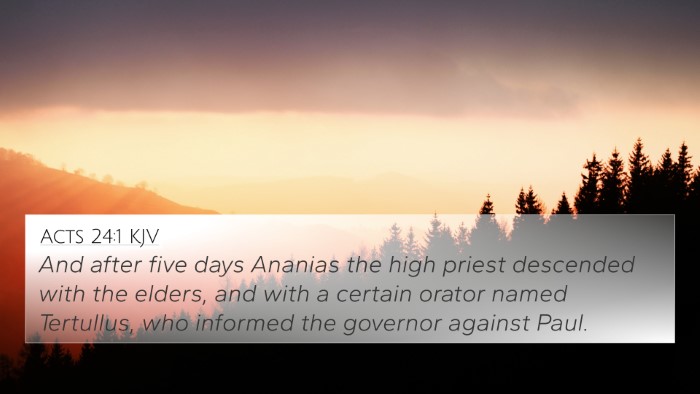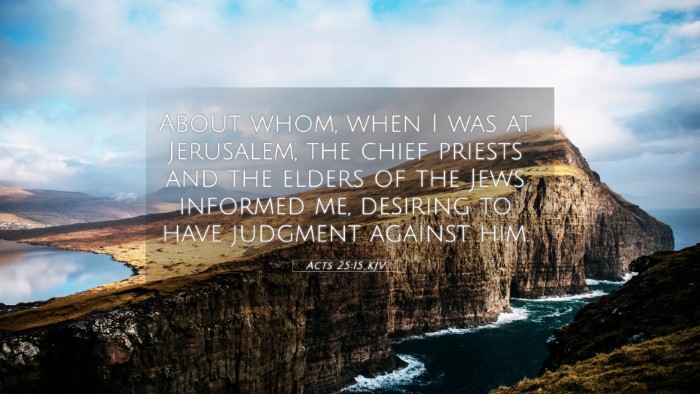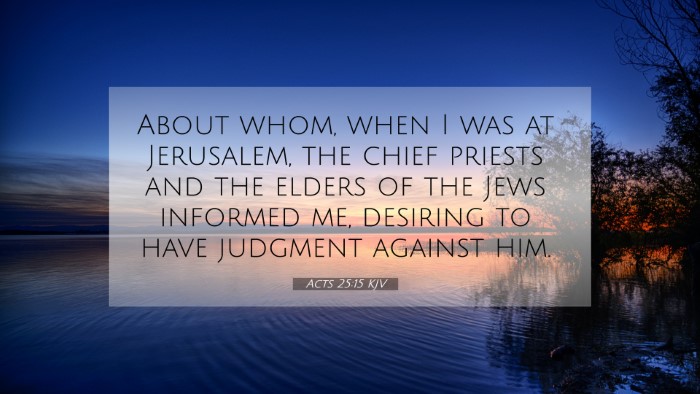Old Testament
Genesis Exodus Leviticus Numbers Deuteronomy Joshua Judges Ruth 1 Samuel 2 Samuel 1 Kings 2 Kings 1 Chronicles 2 Chronicles Ezra Nehemiah Esther Job Psalms Proverbs Ecclesiastes Song of Solomon Isaiah Jeremiah Lamentations Ezekiel Daniel Hosea Joel Amos Obadiah Jonah Micah Nahum Habakkuk Zephaniah Haggai Zechariah MalachiActs 25:15 Similar Verses
Acts 25:15 Cross References
About whom, when I was at Jerusalem, the chief priests and the elders of the Jews informed me, desiring to have judgment against him.
Uncover the Rich Themes and Topics of This Bible Verse
Listed below are the Bible themes associated with Acts 25:15. We invite you to explore each theme to gain deeper insights into the Scriptures.
Acts 25:15 Cross Reference Verses
This section features a detailed cross-reference designed to enrich your understanding of the Scriptures. Below, you will find carefully selected verses that echo the themes and teachings related to Acts 25:15 KJV. Click on any image to explore detailed analyses of related Bible verses and uncover deeper theological insights.

Esther 3:9 (KJV) »
If it please the king, let it be written that they may be destroyed: and I will pay ten thousand talents of silver to the hands of those that have the charge of the business, to bring it into the king's treasuries.

Luke 23:23 (KJV) »
And they were instant with loud voices, requiring that he might be crucified. And the voices of them and of the chief priests prevailed.

Luke 18:3 (KJV) »
And there was a widow in that city; and she came unto him, saying, Avenge me of mine adversary.

Acts 25:1 (KJV) »
Now when Festus was come into the province, after three days he ascended from Caesarea to Jerusalem.

Acts 24:1 (KJV) »
And after five days Ananias the high priest descended with the elders, and with a certain orator named Tertullus, who informed the governor against Paul.
Acts 25:15 Verse Analysis and Similar Verses
Understanding Acts 25:15
Acts 25:15 states: “When I was in Jerusalem, the chief priests and the elders of the Jews informed me about him, asking for a sentence of condemnation against him.” This verse is pivotal in understanding the legal proceedings against the Apostle Paul and offers insights into the dynamics of early Christian persecution.
Summary of the Verse
This verse reveals the accusations made by the Jewish authorities against Paul during his trial. The chief priests and elders were seeking a formal sentence of condemnation, which reflects their ongoing opposition to the early Christian movement.
Insights from Commentaries
Matthew Henry Commentary
Matthew Henry notes that this event highlights the animosity of the Jewish leaders towards Paul. They sought to maintain control over their religious narrative and eliminate any threats, showcasing their unwillingness to accept the truths of the Gospel. Henry also emphasizes the importance of civic order, indicating that the appeal to Roman law was an attempt by the Jews to find justice through worldly means, despite their motivations.
Albert Barnes Commentary
Albert Barnes points to the political dimensions of Paul's situation, suggesting that the accusations are a reflection of the broader tensions between the Jewish leaders and Roman authority. He underscores that these leaders did not have the power to carry out execution, which necessitated their appeal to Festus, the Roman governor. Barnes illustrates the intricate political and legal maneuvering that characterized early Christianity's interactions with the Roman government.
Adam Clarke Commentary
Adam Clarke focuses on the implications of the Jewish leaders' response to Paul. He explains that their appeal for condemnation indicates their desperation to suppress the growing influence of Christianity. Clarke also reflects on the significance of revealing such trials, emphasizing the faithfulness of Paul in facing his accusers while maintaining his dedication to spreading the Gospel.
Thematic Connections
This verse establishes a connection with several other Bible verses that deal with themes of persecution, justice, and the interplay of faith and governmental authority. Here are some notable connections:
- Matthew 10:17-20 - Jesus warns His followers about being brought before governors and kings, emphasizing divine assistance in the moment of persecution.
- John 15:20 - A reminder that disciples will face persecution akin to that faced by Christ, illustrating the ongoing conflict between the Gospel and worldly authorities.
- Acts 4:18-20 - The apostles’ resolve to obey God rather than human authorities when faced with opposition.
- Romans 13:1-5 - Paul discusses the establishment of earthly authorities and the Christian’s duty to submit, highlighting a complex relationship with governmental power.
- 1 Peter 2:12-17 - An exhortation to maintain good conduct among non-believers, which speaks to the witness of Christians in the face of authority.
- Acts 23:29 - Previous trials where Paul’s legal rights were respected, forming a precedent for his ongoing defense.
- Psalm 119:86 - A recognition of God’s law amid false accusations, paralleling Paul’s unwavering commitment to the truth.
The Importance of Cross-Referencing
Cross-referencing Bible verses enriches understanding and allows for a more comprehensive grasp of biblical themes. Tools for Bible cross-referencing enable deeper study and can provide insights into how the verse fits within the broader biblical narrative. For those interested in exploring:
- Tools for Bible Cross-Referencing - Various materials can assist in linking relevant passages for deeper study.
- Bible Concordance - A resource to locate verses and identify common themes across different texts.
- Bible Cross-Reference Guide - Guides that help in navigating similar scripture passages easily.
- How to Find Cross-References in the Bible - Methods for identifying thematic connections between scriptures.
- Cross-Referencing Bible Study Methods - Different approaches one can take to study linked verses effectively.
Conclusion
Acts 25:15 serves as a crucial reminder of the historical and theological significance attached to the Apostle Paul's trials. Understanding this verse through the lens of various biblical commentaries provides clarity on its implications and helps in forming a cohesive understanding of the early Christian movement. By engaging with cross-references, believers and seekers alike can better appreciate the interconnectedness of scripture and the continual relevance of God's message through His Word.


